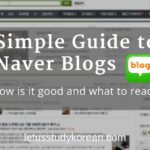[Grammar] ~(으)ㄴ/는지
~(으)ㄴ/는지 (~eun/neun-ji) – whether or not… ~(으)ㄴ/는지 is used in conjunction with interrogative/questioning words like 왜 (why), 어디 (where), 언제 (when), 뭐 (what), 누구 (who), 어떻게(how). We see ~(으)ㄴ/는지 used in many sentences, spoken or written very often. ~(으)ㄴ/는지 is often used…




